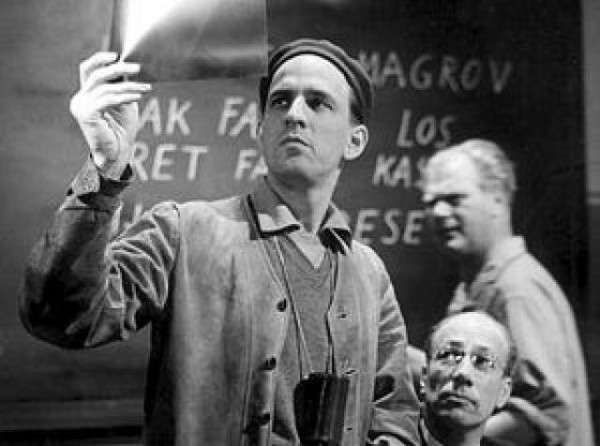
Image via Wikimedia Commons
You may remember our October post on Ingmar Bergman’s evaluation of his equally titanic colleagues in cinema, from Jean-Luc Godard (“affected”) to Alfred Hitckcock (“infantile”). Though the Bergman faithful and fans Andrei Tarkovsky often find much to disagree about, the Swedish director of pictures like Wild Strawberries and Persona had the absolute highest praise for the Russian director of pictures like Andrei Rublev and Solaris. (Watch Tarkovsky’s major films free online here.) “When film is not a document, it is dream,” said Bergman. “That is why Tarkovsky is the greatest of them all. He moves with such naturalness in the room of dreams. He doesn’t explain. He is a spectator, capable of staging his visions in the most unwieldy but, in a way, the most willing of media. All my life I have hammered on the doors of the rooms in which he moves so naturally.”
And now we have a few more words the older master spoke about the younger, whom he physically outlived — but, by his own admission, couldn’t artistically outdo — thanks to a certain Tyler Harris, who posted them to My Criterion. In his remarks there, Bergman continues with the metaphor of Tarkovsky an an inhabitant of a realm of dreams: “Suddenly, I found myself standing at the door of a room the keys of which had, until then, never been given to me,” Bergman said of first watching Andrei Rublev, which he named at the Göteborg Film Festival 1994 as a favorite. “I felt encouraged and stimulated: someone was expressing what I had always wanted to say without knowing how.” He also selected Federico Fellini’s La Strada, which prompted a background story about his ill-fated collaboration with Fellini and Akira Kurosawa under legendary producer Dino de Laurentiis. Kurosawa’s own Rashomon, which you can watch free online, also appears on this favorites list of Bergman’s, which runs, alphabetically, as follows:
- Andrei Rublev (Andrei Tarkovsky, 1971)
- The Circus (Charlie Chaplin, 1928)
- The Conductor (Andrzej Wajda, 1980)
- Marianne and Juliane (Margarethe von Trotta, 1981)
- The Passion of Joan of Arc (Carl Theodor Dreyer, 1928)
- The Phantom Carriage (Victor Sjöström, 1921)
- Port of Shadows (Marcel Carné, 1938)
- Raven’s End (Bo Wilderberg, 1963)
- Rashomon (Akira Kurosawa, 1950)
- La strada (Federico Fellini, 1954)
- Sunset Boulevard (Billy Wilder, 1950)
Related Content:
Martin Scorsese Reveals His 12 Favorite Movies (and Writes a New Essay on Film Preservation)
Ingmar Bergman’s Soap Commercials Wash Away the Existential Despair
Stanley Kubrick’s List of Top 10 Films (The First and Only List He Ever Created)
Colin Marshall hosts and produces Notebook on Cities and Culture and writes essays on cities, Asia, film, literature, and aesthetics. He’s at work on a book about Los Angeles, A Los Angeles Primer. Follow him on Twitter at @colinmarshall or on his brand new Facebook page.


I get that Sunset Boulevard is good, but I’ve never understood why it’s wonderful.nnnAnd it’s so, so depressing.
I don’t get Bergman’s alleged “genius”. I do, however, get the purpose of these lists, or when a director gives praise to another director, and so on. It has very little to do with the alleged artistic qualities of those films.
I don’t understand what Jkop is talking about. I think that a list of your favorite films might be just that. A list of your favorite films. We all have one. And I would expect any film maker to have favorite movies. You don’t become a film maker unless you love movies (at least not an arthouse movie type of guy).
As to Bergman’s genius. I don’t know, I guess you just have to be into the arthouse movies? Because he’s like, if you put movies on a continuum, with Michelangelo Antonioni on one end and Michael Bay on the other, he would be very close to the Antonioni side. That is to say that, it might be a bit too artsy for some people to endure. And that’s perfectly fine. Everyone has their own taste. Some people get them and some people don’t. Or maybe you love arthouse but just don’t like Bergman, not your cup of tea, that’s fine too. It’s all good, different strokes for different folks as they say.
As for me, he’s not my favorite but I do like his movies. It’s more like watching a painting or a visual poem. I can’t really put my finger on it though. At the risk of sounding pretentious, I think it’s the mise en scene, the look and feel of his movies. I like the mood and especially the settings, I can’t explain it something about the world of his films is just really pleasurable to watch for me. They are moody, evocative, raw. Though I haven’t seen that many, only the black and white ones, not the color ones so I don’t know about them. But that’s how I would describe the ones I’ve seen anyway.
My favorite movie of his is The Magician. It’s kind of a minor film I guess, but it’s a good example of the way he can just create a great visual world to set his stories in. There is something dreamy about all his movies (that I’ve seen anyway). I would recommend that movie for sure.
i do like your site
Well put Mr. Lokezombie!
Andrei Rublev’s date is way off at the listed 1971. If memory holds, it was made in 1966, and released (thanks to Soviet tyranny) only in 1968.